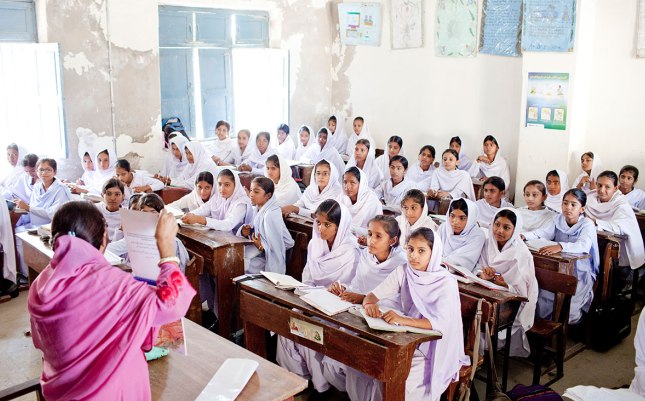Menstrual Hygiene Management in Pakistan remains a Taboo in Pakistan and in rural areas – of Khyber Pakhtunkhwa specifically. Following is the article written by Saifullah Khan (Director Research & Development) in 2010.
Abstract
Menstruation, a natural process in women’s life needs special care from physical and psychological point of view. Negligence in menstrual hygiene can result in biological disorders for example different sorts of infections but unfortunately awareness concerning this area of life is not highlighted due to socio-cultural trends of our society. In present age menstrual hygiene needs more attention because of rapidly increasing active participation of females in different walks of life. It has become necessary to analyze their relevant problems and prepare different strategies for solution. These solutions should be in accordance with social norms and traditions. Problems during menarche, effects of menstruation on studies, proper use of hygiene products, hygiene practices during menarche and source of information for girls during menarche have been focused in this study. Menstrual hygiene promotion will be an indirect support to gender equality, national development, high literacy rate and MDGs accomplishment.
Menstruation: Scientific Perspective
Menstruation is one of the most important stage in a women’s life it is a symptom of adolescence that is the beginning of adult hood, it signals the possibility of fertility. Timing of menarche is influenced by both genetic and environmental factors, especially nutritional status. Puberty in girls is the phase of transition from child to mature woman.
Social Perspective
This is a natural process but due to illiteracy, ignorance about religious teachings, poverty, socio-cultural trends, negligence regarding psychological health and poor health facilities there’s not much discussion on this topic that results in negative. One of the main reasons behind the issue is that menstruation is considered in many societies including Pakistan a hidden and secret issue even in many societies this is not openly discussed between mother and daughter. In many cultures menstruation is being perceived as unclean and embarrassing and also believed that it must remain hidden in communication.
Financial Perspective
Majority of girls in low-income countries cannot afford a monthly supply of feminine hygiene products. Women and girls in poor countries can’t afford sanitary pads or tampons, which would normally be changed around four times a day during menstruation for example in our rural areas females are used to use only one ordinary cloth for almost four days of their menstruation which is absolutely unhygienic.
Lack of Knowledge
In schools there are no proper facilities for menstrual waste management; girls don’t know how to dispose it off properly especially in time of immediate need. The focus on menstrual hygiene management is an essential part of promoting hygiene and sanitation amongst adolescent girls and women who constitute approximately 45 per cent of the total female population.
High Drop out from School and Poor Performance
Adolescent girls are often absent from school due to menstruation related issues. The accompanying abdominal cramps, headaches and fatigue, coupled with poor facilities and lack of counseling, all contribute to monthly absenteeism, which can be as high as 20%. It is often a first step to dropping out of school completely.
At school, girls are faced with poor facilities inadequate water for washing, lack of soap, no privacy and non-functioning or insufficient toilets. This reduces school attendance. It is important to realize that one out of two 13 year old girls will probably be menstruating. One in eight girls begins to menstruate (menarche) when she is 11 years or younger.
One of the reasons behind high drop out of girls from school in Asia is their difficulty in managing menstruation. The idea is that they don’t have decent sanitary products and so stay home during their periods and then get further and further behind and finally drop out.
The problem also affects the teachers’ performance the monthly menstruation period also creates obstacles for female teachers. They either report themselves sick or go home after lessons as fast as possible and do not have enough time to give extra attention to children who need it.
According to a study conducted in Nepal suggested that the main reason they stayed away was cramps nearly 44% of the girls cited cramping as the reason they couldn’t make it to school while they were menstruating.
One of the main reasons behind the issue is that menstruation is considered in many societies including Pakistan a hidden and secret issue even in many societies this is not openly discussed between mother and daughter. In many cultures menstruation is being perceived as unclean and embarrassing and also believed that it must remain hidden in communication.
Across the developing world, the lack of appropriate and adequate sanitation facilities prevent girls from attending school, particularly when they are menstruating. There is no private place to change and clean the rags and often no safe water and soap to wash them properly. A culture of shame and embarrassment forces them to seek for well-hidden places even in their homes to dry the rags. These places are often damp, dark and unhealthy. This practice is responsible for a significant proportion of illness and infection associated with female reproductive health. Rags that are unclean cause urinary and vaginal infection. Very often serious infections are left untreated. This study was done in urban slum and rural Bangladesh but the same situation exists in rural area of Pakistan.
Environmental Degradation
The issue has major impacts on Environmental degradation. Environmental degradation refers to any impact on the natural environment which causes harm to plants, animals, soil structures, water quality, air quality, or aesthetic qualities. Menstrual waste means by-products of menstruation and menstrual management and includes items such as sanitary pads, tampons, human bodily excretions, product wrapping, and toilet paper. Composition of menstrual waste, the interaction of that waste with the natural environment (soil, water, and air) disturbs the environment.
Another report says that in developing countries, which frequently have poor waste management infrastructure, this type of waste will certainly produce larger problems. For this reason, encouraging menstrual hygiene in developing countries must be accompanied with calculated waste management strategies.
In Case of Immediate Need
In schools there are no proper facilities for menstrual waste management; girls don’t know how to dispose it off properly especially in time of immediate need. They don’t have proper feminine products for immediate use in outdoor especially in schools.
Keeping in view the importance of the issue different researches and studies done in it is important to have a look over few important previous researches.
Physical Problems
Physical structure of a female is more vulnerable to infections so the problems that a female have to face due to poor MH are here below;
- Urinary tract infection
- Uterine infection
- Irritation
- Leucorrhea
- Discharge
- Pelvic inflammatory diseases includes pains
Psychological Problems
- Anxiety
- Tension
Domestic Problems
Medical expenses, lack of proper health facilities and less access to medication results in restlessness as well as in economic and financial crisis in a family.
Disturbed Relationship between Husband and Wife
There are following reasons behind the disturbed relationship;
- Sexually transmitted infections from wife to husband
- Effects on children due to mother’s weakness, carelessness or tension
- Domestic work disturbs as a house wife can’t fulfill her responsibilities towards her house and family.
IRSP Interventions for MHM
Integrated regional support program (IRSP) is a multi-sector development organization working in the field of water & sanitation in different parts of country since last 2 decades. IRSP has partnership with World Bank, WaterAid, European commission, UNICEF, Oxfam and Government agencies to streamline the issues of water, sanitation and hygiene promotion in the country.
Keeping in view the importance of Menstrual Hygiene Management, first need assessment survey was conducted on MHM in rural areas of Khyber Pukhtunkhwa (previously known as N.W.F.P) in 2010, it planned to initiate a project in four selected Union Councils of Mardan district in collaboration with WaterAid. After survey it is planned to begin with basic trainings in government girls’ schools and in BHUs (Basic health units) on health and hygiene during menstruation. In order to convey the messages among students, teachers and lady health workers, IEC material has also been developed in form of booklets.
Menstrual Hygiene Management in Pakistan during flood emergency (2010)
In current flood emergency, Females were using old and dirty clothes so, IRSP is not only providing sanitation pads, clothes and other sanitary products but also working to educate females on MHM in hygiene sessions so that they can manage it easily, in these sessions they learn to use sanitary clothes because due to their rural background they don’t know how to manage menstruation properly and this attitude has become more difficult and dangerous for them in existing situation. To satisfy their demand for sanitary products IRSP and WaterAid first MH kit distribution has been completed successfully on 6th, Nov 2010.
Another important issue was the issue of menstrual waste disposal during current emergency and in routine life also. Menstrual waste disposal was absolutely improper in camps and even in houses of flood affectees. They were used to throw openly or burn openly which is hazardous for environment. Improper disposal of used material can lead towards various kinds of infections so IRSP planned for advocacy campaign to address the issue of MHM.
Females from 12 to 50 years of age were in the beneficiaries but young and unmarried females were more focused because it was difficult for them to discuss their issues with anybody. 800 Menstrual hygiene kits have been designed with all relevant products and distributed.
To update the community’s knowledge on importance of menstrual health, hygiene and to educate the females about use of kit and proper MHM hygiene awareness sessions were conducted in 2, flood affected UCs.
UNICEF is working to ensure special protection according to Convention on the Rights of the Child and striving to establish children’s rights as given in ethical principles and international standards of behavior towards children, for the most disadvantaged children; victims of war, disasters, extreme poverty, all forms of violence and exploitation and those with disabilities along with that it is promoting the equal rights of women and girls to support their full participation in the political, social, and economic development of their communities.
Menstrual Hygiene Management in Pakistan: Recent situation
There are still No policies in place for implementation of proper menstrual hygiene management conditions in Pakistan but IRSP has been Training on Menstrual Hygiene Management Low Cost Sanitary Pad Preparation the local people since the last decade and more. There is still more to do by the government and local CSOs.

